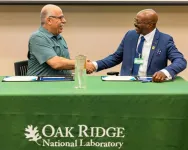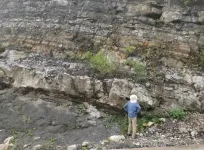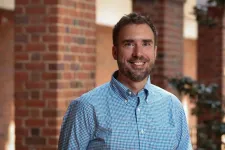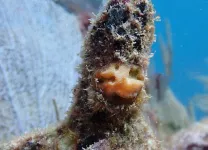(Press-News.org) U2opia Technology has licensed Situ and Heartbeat, a package of technologies from the Department of Energy’s Oak Ridge National Laboratory that offers a new method for advanced cybersecurity monitoring in real time. Situ, which discovers and understands otherwise-undetectable events by analyzing security data, will go to the market through a commercial license. The company will continue to explore opportunities for Heartbeat, which detects cyber attacks by focusing on the physical behavior of a protected device, through a research and development license.
U2opia Technology, a woman- and minority- led company, is directed by Maurice Singleton III, chief executive officer, and chaired by Joaneane Smith.
Though Singleton first learned of the power of technology transfer partnerships 25 years ago, it wasn’t until 2019 that he began to pursue a partnership with a national laboratory.
During an event at ORNL on Sept. 5 to celebrate the licensing, Singleton recalled that Stacy Prowell, a cyber security scientist in ORNL’s Cyber Resilience and Intelligence Division, persuaded him to make the leap. “Stacy was enthusiastic. He said, ‘You have the right concept, and we have the right tools at ORNL. We can solve this problem.’”
Situ, developed by a team led by ORNL’s John Goodall, was supported by funding through ORNL’s Laboratory Directed Research and Development, or LDRD, program, DOE, the Department of Defense and the Department of Homeland Security. Heartbeat, developed by a team led by Prowell, was supported through the lab’s Technology Innovation Program, or TIP.
“This partnership is a great example of connecting researchers and innovators to companies through programs like LDRD and TIP, which leads to global impact,” said Jennifer Caldwell, ORNL director of technology transfer.
U2opia licensed both technologies for research and development purposes in 2023. The partnership between ORNL and U2opia has been recognized by the Federal Laboratory Consortium, earning an award for excellence in technology transfer.
Situ and Heartbeat were developed through multi-disciplinary research drawing on mathematics, data science, software engineering, computing, artificial intelligence and complex systems, creating practical solutions to protect the nation’s infrastructure.
Enhancing digital security is a key priority for DOE and ORNL, as threats to America’s national security emerge at a rapid pace.
“Thanks to our researchers’ creativity and dedication, ORNL continues to advance technologies that benefit our nation’s security,” said Moe Khaleel, associate laboratory director for the lab’s National Security Sciences Directorate.
Improved cyber security is also a pressing concern for small businesses. “Fifty percent of all small businesses breached by cyber security attacks go out of business,” Singleton said. “We need to get research out of the filing cabinets and into the marketplace, because it is difficult as a small business to allocate funds and resources to conduct R&D.”
Delphia Howze, chief inclusion officer at ORNL, said, “Technology developed in the national laboratory system has the potential to transform small businesses; equitable access to its resources is very important to the Department of Energy. At ORNL, we have the privilege and responsibility to be intentional and inclusive. ORNL works with hundreds of small businesses through our Small Business Office, in regional economic development efforts, partnership agreements and technology licenses. Nearly half of our licenses in 2024 are with small businesses.”
In addition to Goodall and Prowell, the ORNL development team includes Joel Reed, Joel Dawson, Aaron Ferber, Ali Passian, Jeff Nichols, Kelly Huffer and Dave Richardson. Former ORNL researchers Bobby Bridges, Erik Ferragut, Michael Iannacone, Jason Laska, Lane Harrison, Jarilyn Hernandez Jimenez and Christopher Rathgeb also contributed to the technologies.
Senior commercialization manager Andreana Leskovjan negotiated the terms of the license. Browse ORNL’s portfolio of information technology and communications innovations.
UT-Battelle manages ORNL for DOE’s Office of Science, the single largest supporter of basic research in the physical sciences in the United States. The Office of Science is working to address some of the most pressing challenges of our time. For more information, please visit energy.gov/science. — Brynn Downing
END
U2opia signs license to commercialize anomaly-detection technology for cybersecurity
2024-09-18
ELSE PRESS RELEASES FROM THIS DATE:
Explaining dramatic planetwide changes after world’s last ‘Snowball Earth’ event
2024-09-18
Some of the most dramatic climatic events in our planet’s history are “Snowball Earth” events that happened hundreds of millions of years ago, when almost the entire planet was encased in ice up to 0.6 miles (1 kilometer) thick.
These “Snowball Earth” events have happened only a handful of times and do not occur on regular cycles. Each lasts for millions of years or tens of millions of years and is followed by dramatic warming, but the details of these transitions are poorly ...
Cleveland Clinic study is first to show success in treating rare blood disorder
2024-09-18
Wednesday, September 18, 2024, CLEVELAND: A clinical trial has demonstrated that the cancer drug pomalidomide is safe and effective in treating hereditary hemorrhagic telangiectasia (HHT), a rare bleeding disorder that impacts more than 1 in 5,000 people worldwide. The trial, led by Keith McCrae, M.D., of Cleveland Clinic and supported by the National Institutes of Health, was stopped early because of these successful findings, and has been published in the New England Journal of Medicine.
The impetus for this trial was a single patient. About ...
Bone marrow cancer drug shows success in treatment of rare blood disorder
2024-09-18
A clinical trial supported by the National Institutes of Health (NIH) was stopped early after researchers found sufficient evidence that a drug used to treat bone marrow cancer and Kaposi sarcoma is safe and effective in treating hereditary hemorrhagic telangiectasia (HHT), a rare bleeding disorder that affects 1 in 5,000 people worldwide. The trial results, which are published in the New England Journal of Medicine, detail how patients with HHT given the drug, called pomalidomide, experienced a significant reduction in the severity of nosebleeds, needed fewer of the blood transfusions and iron infusions that HHT often demands, ...
Clinical trial successfully repurposes cancer drug for hereditary bleeding disorder
2024-09-18
A drug approved for treating the blood cancer multiple myeloma may offer a safe and effective way to reduce the risk of severe nosebleeds from a rare but devastating bleeding disorder. Hereditary hemorrhagic telangiectasia (HHT), the world's second-most-common inherited bleeding disorder, affects approximately 1-in-5,000 people and can have life-threatening complications, but there are currently no U.S. FDA-approved drugs to treat HHT. The PATH-HHT study, the first-ever randomized, placebo-controlled ...
UVA Engineering professor awarded $1.6M EPA grant to reduce PFAS accumulation in crops
2024-09-18
Associate professor of chemical engineering Bryan Berger received funding from the Environmental Protection Agency to reduce the impact of per- and polyfluoroalkyl substances, known as PFAS, in food and farming communities.
The award is part of the over $15 million the EPA granted to 10 institutions for PFAS reduction research, aimed at improving farm viability and increasing knowledge of PFAS accumulation.
Water sample collection for testing in Limestone, Maine. (Contributed photo)
Known as forever chemicals, PFAS are man-made substances that have been used in industry ...
UVA professor receives OpenAI grant to inform next-generation AI systems
2024-09-18
Superintelligence — AI systems that surpass human intelligence — could be just a decade away, raising urgent questions about how to ensure their safety and alignment with human values, according to OpenAI.
These AI systems could be hugely beneficial, but more sophisticated systems create the possibility for unpredictability. Misinterpreting human values or intent, algorithmic biases and security risks are all cause for concern, especially with highly developed AI systems where the potential consequences are far greater.
Yu Meng, assistant professor of computer science at ...
New website helps researchers overcome peer reviewers’ preference for animal experiments
2024-09-18
WASHINGTON, D.C.—A new website, AnimalMethodsBias.org, created by the Coalition to Illuminate and Address Animal Methods Bias (COLAAB), provides researchers guidance and resources aimed at helping them successfully publish nonanimal biomedical research by overcoming the preference some peer reviewers have for animal-based research methods.
“We recently found that half of researchers surveyed had been asked by reviewers to add an animal experiment to their otherwise animal-free study,” says Catharine ...
Can the MIND diet lower the risk of memory problems later in life?
2024-09-18
MINNEAPOLIS – People whose diet more closely resembles the MIND diet may have a lower risk of cognitive impairment, according to a study published in the September 18, 2024, online issue of Neurology®, the medical journal of the American Academy of Neurology. Results were similar for Black and white participants. These results do not prove that the MIND diet prevents cognitive impairment, they only show an association.
The MIND diet is a combination of the Mediterranean and DASH diets. It includes green leafy vegetables like spinach, ...
Some diabetes drugs tied to lower risk of dementia, Parkinson’s disease
2024-09-18
MINNEAPOLIS – A class of drugs for diabetes may be associated with a lower risk of dementia and Parkinson’s disease, according to a study published in the September 18, 2024, online issue of Neurology®, the medical journal of the American Academy of Neurology.
The study looked at sodium-glucose cotransporter-2 (SGLT2) inhibitors, which are also known as gliflozins. They lower blood sugar by causing the kidneys to remove sugar from the body through urine.
“We know that these neurodegenerative diseases like dementia and Parkinson’s disease are common and the number of cases is growing as the ...
Propagated corals reveal increased resistance to bleaching across the Caribbean during the fatal heatwave of 2023
2024-09-18
SECORE International’s Coral Seeding approach utilizes assisted reproduction, the breeding of corals, for reef restoration. This approach is realized within a training and partner network throughout the Caribbean. Now, a peer-reviewed study shows that all the effort was worthwhile: during the devastating heatwave in the Caribbean in 2023, the young, bred corals out on the reef stayed healthy while most of the remaining wild corals bleached and many died in the aftermath.
The summer of 2023 was deadly for many corals in the Caribbean Basin. An unprecedented heatwave, in intensity as well as in duration, hit the Caribbean with catastrophic ...







